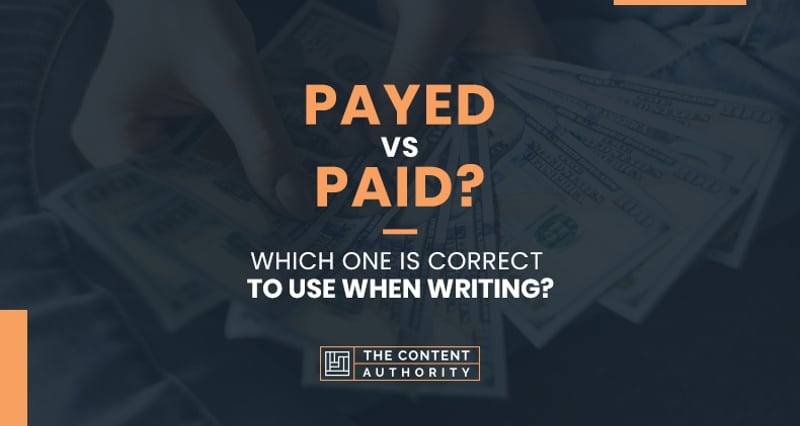As simple as the use of the English language is, there are still some foundations you must have established to use the language correctly. You have two words: Payed vs Paid, and you are probably thinking, which one is correct to use in a sentence?
The word “payed” is the past tense form of and past participle of pay and it is one of the least commonly used words in the English language and it is used only with wooden ship hulls and cables or ropes. “Paid” is also the past tense and past participle of the word pay and it is more commonly used than “payed.”
Though, there is still a lot to be learned on how to use these words correctly in a sentence. Can you use these words interchangeably and still convey the right message? These are questions that will be answered extensively in this article.

Correct Spelling: When To and How to Properly Use “Payed” in a Sentence
We will talk about when and how to use the word “payed” in a sentence when writing. However, it is imperative to know and understand the meaning, origin, and nature of the word. Also having proper knowledge of the synonyms and antonyms of the word is very important. Accurate usage of a word when writing depends on the things mentioned above.
The origin of a word refers to the genesis of the word. This means where the word was coined out. The etymology of lots of English words can be traced back to Greek, French, Latin, Spanish, and German words.
When we talk about the meaning or definition of a word, we are simply talking about what the word denotes or infer, what the word is intending to communicate to the reader. It is what the word implies in the context it is used. And it is one of the easiest things to remember in a word that will constantly help you when writing.
As we all know, the synonyms of a word refer to other words similar in meaning to the word in question. Antonyms refer to words opposite in meaning to the word in the discussion.
Now that we have established the essential foundation that you must have, let us dive into the origin of the word “payed”?
The word “payed” originates from Middle English, from the Anglo-French word “paier”, from Latin “pacare” meaning to pacify, from “pac”, “pax” which means peace.
Moving forward, we will look at the meaning of the word “payed”. We use the word “payed” to refer only to the nautical meanings of it as a verb. It means to prevent leakage in the deck or seams of a ship using tar or pitch. The word “payed” is used only in the context of sailing or dealings with ropes. “Payed” is also used when we are referring to a link or a chain of payment. It also means to give something back for something.
The synonyms of the word “payed” include compensate, borne, indemnified, layout, bestow, discharge, expend, grant, atone, settlement, bailed, conducted, and footed. The antonyms of “payed” include beg, break, disallow, loss, neglect, obstruct, block, bomb, damage, deprive, prevent, ruin, spurn, destroy, harm, penalize, prejudice, vandalize, take, and debt.
Here are some examples that show the use of the word “payed” in a sentence.
- When she was asked why she was weeping, she said she gave her ex-boyfriend her love and heart and he payed her back by breaking her heart.
- To prevent his ship from sinking, the captain gave the order and all seamen onboard payed the ship.
- The sailor’s daughter payed out the rope so that her brother could catch the other end of the rope.
- All the extra training with the football team payed off as they performed beautifully at the final match and won the cup.
- He reluctantly payed the deck with tar because he was threatened by the captain of the ship.
- At the Caribbean, he payed his ships with the asphalt of the famous pitch lake and stood beneath the noble forest.
When To And How To Properly Use “Paid” When Writing
Now that we have established the accurate use of the word “payed” in a sentence, we will move to the use of the word “paid”. As we did in the previous explanation on “payed”, we will look into the origin, meaning, synonyms, and antonyms of the word “paid”. This way, your understanding of these homophones will be complete, and you will know when and how to use both words correctly.

It is important to note that the word “paid” is a verb. This means that it denotes an action in a sentence. The word “paid” means to give someone money either as a payment or a debt. The word “paid” also refers to giving respect, attention, or compliment to someone. It can also mean suffering a misfortune as a consequence of an action.
What is the origin of the word “paid”?
The word “paid” was coined out from the Middle English word “payd,” which is from an Old French word “paie” and “payer”, gotten from the Latin word “pacare” which means “appease” which is from the word “pax”, “pac” which means “peace”.
Some of the synonyms of the word “paid” include reward, suffer, atone, recompense, tip, finance, fund, disburse, pay off, settle, grant, give, render, offer, compensate, repaid, cleared, out of debt, refunded, and waged. The antonyms of “paid” include owing, uncompensated, outstanding, due, undischarged, overdue, free, indebted, behind, unwaged, and debt.
Now, we will look at some examples that show how the word “paid” is used accurately in a sentence.
- When we were presented with our electricity and water bill, I borrowed some money and made sure I paid the bills immediately.
- Due to the closeness between myself and my late friend, it was only proper that I paid respect to him during his funeral by attending.
- The director of the company where I worked paid off all workers after requesting that they all go on leave.
- Every day, I visit my employee’s house, clean and dust the whole place because it is what I was paid to do.
- The owner of the restaurant that he robbed made sure he paid fully for his crimes after he was arrested by the police officers.
- The upcoming musician visited many cities and countries to perform and was well paid for his exquisite music.
- After the death of his wife, he never paid attention to any woman until he met the young lady at the mall.
The word “paid” is also used as a phrase. Some examples are listed below.
- Paid for: this means to pay money for something that requires it.
- Put paid to: this means to end or destroy.
- Paid in full: this means to pay all of the money you owe.
- Paid off: this means to result in profit or advantage, to succeed.
- Paid the price: this means to experience something unpleasant as a result of your actions.
Payed vs Paid: Understanding the Difference Between Both Words
So far, we have explained how to and when to use the words “payed” and “paid”. We have also provided their meaning, origin, synonyms, and antonyms. This provides accurate information on knowing the right word to use when writing.
However, there is something that can get you confused with the use of both words which you must clear up. The word “payed” and “paid” are both past tense of the word “pay”, but “payed” is used in the nautical sense while “paid” has to do with the financial or transactional aspects.
In the modern world today, people hardly use “payed” when writing as it is more common to the historical terms. Nevertheless, “payed” is still an English word that can be used when writing about cable, ropes, chains, and ships.
While “paid” is a regular word in the modern world as it is mostly used when it comes to financing as the past tense of pay, “paid” also has other meanings like to visit or to call. The word also refers to giving something abstract like attention for example.
We must keep these differences in mind when deciding which word to use when writing.

Final Thoughts
Though a lot of confusion may come as a result of the suffix “–ed” added at the back of a word to denote past tense. Not to worry, all explanations to help make writing better has been given. Note therefore that these words cannot be used interchangeably. With the understanding of each word’s nature, you can be able to differentiate them when writing.
The origins, meanings, usage, synonyms, and antonyms of each word have been fully explained above. Now, you have the correct and adequate knowledge of how and when to use both words, you can start writing without confusion. All you need to do is read up and acquire the knowledge.
Shawn Manaher is the founder and CEO of The Content Authority. He’s one part content manager, one part writing ninja organizer, and two parts leader of top content creators. You don’t even want to know what he calls pancakes.

